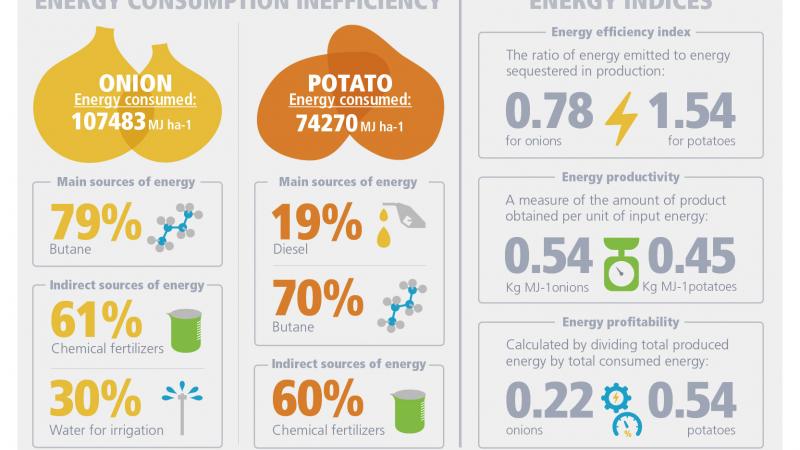Energy efficiency: a critical driver of sustainability?

A recent ICARDA study into the energy efficiency of Morocco’s commercial vegetable sector offers important insights to enhance the country’s investment in sustainable agricultural production.
Although agricultural innovation has undoubtedly strengthened global food security, there has also been an environmental cost: agriculture has become increasingly energy-dependent and is now a major emitter of greenhouse gases. Improving the sector’s energy efficiency – the ability to produce the same level of output with minimal resources - is therefore a critical issue.
Understanding energy-efficiency in Morocco
ICARDA and its partners measured energy efficiency in the commercialized vegetable sector of Morocco’s El Hajeb region, specifically the production of onions and potatoes. In order to investigate current energy consumption trends and identify unsustainable practices, researchers surveyed 60 randomly-chosen farmers and estimated greenhouse gas emissions using PLANETE – a tool designed to measure fossil energy consumed directly or indirectly through inputs into an agricultural system.
Energy consumption was generally inefficient. Onion production consumed 107483 MJ ha-1, with butane as the main source of direct energy (79.5 %), and chemical fertilizers (61.53%) and water for irrigation (30%) as the main sources of indirect energy. The figure for potato production was 74270 MJ ha-1, with butane (70%) and diesel (19.14%) as primary sources of direct energy, and chemical fertilizers (60 %) as the main source of indirect energy.
Energy indices were also estimated: the energy efficiency index, the ratio of energy emitted to energy sequestered in production, was 0.78 for onions and 1.54 for potatoes; energy productivity, a measure of the amount of product obtained per unit of input energy, was 0.54 kg MJ-1 and 0.45 kg MJ-1; and energy profitability, calculated by dividing total produced energy by total consumed energy was estimated to be 0.22 and 0.54.
Promoting energy efficiency
The results suggest the need for several policy changes: the over-reliance on butane demonstrates a need for subsidy reform and a shift towards cleaner sources of energy; inefficient irrigation systems require the improved speed, duration, and frequency of water application – such as that provided by drip irrigation; and more rational fertilizer application is also called for – given the significant amount of energy sequestered in its production.
This research was supported by the CGIAR Research Program on Dryland Systems.
This article is based on a paper recently published in the Journal of Agricultural Science Vol. 9 (1) entitled: Energy Consumption in Onion and Potato Production within the Province of El Hajeb (Morocco): Towards Energy Use Efficiency in Commercialized Vegetable Production.
Author: Boubaker Dhehibi, Agricultural Research Economist (ICARDA)
